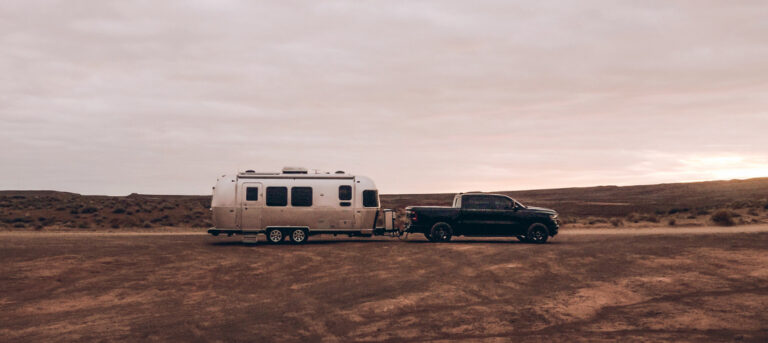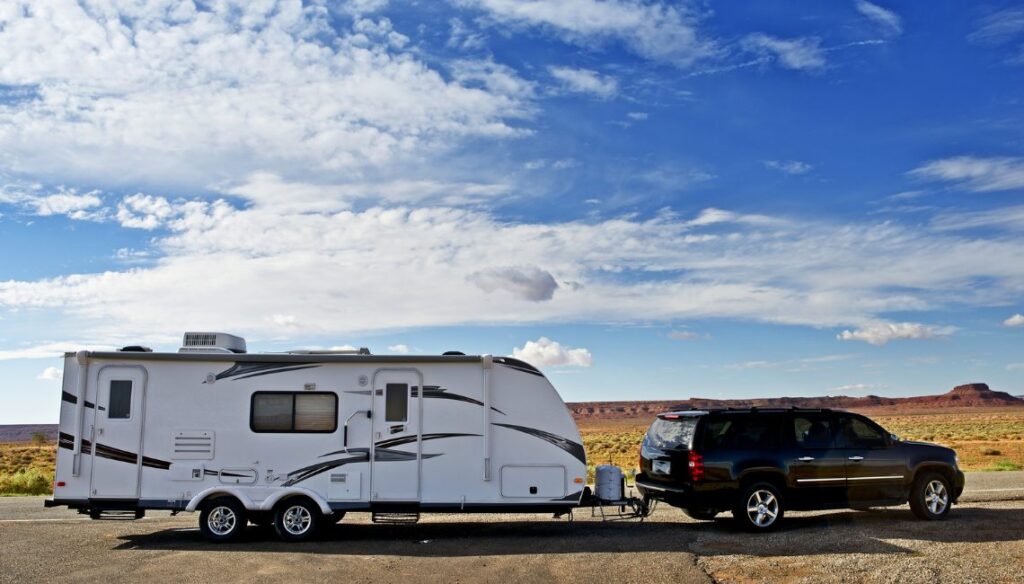
One of the most important things to consider when purchasing a trailer is its weight and the towing capacity of your vehicle.
Today we’re going to dive deep into this topic! You’ll learn why it’s so important to pay attention to towing capacity, how to increase towing capacity, and how to improve towing performance. After reading, you should have all the information you need to decide whether your truck can tow your desired RV and what kinds of adjustments you’ll need to make that happen.
How to Increase Towing Power
You can make a variety of upgrades to increase the towing capacity of your vehicle, so you can tow more without damaging your trailer and still keep your passengers and fellow drivers safe.
1. Get the Right Hitch
Your first upgrade should be to invest in the right type of hitch. You’ll want a hitch that is rated to handle the weight of your trailer. In order to help your vehicle tow a larger bumper-pull trailer, you’ll also want a weight distribution hitch.
The weight distribution system does exactly what you might think: It distributes the weight of the trailer throughout more of your tow vehicle’s frame instead of just the hitch receiver area. This helps your truck’s suspension and makes it possible to pull a larger amount of weight.
2. Use a Programmer
Most vehicles are set to give the user the best fuel efficiency possible without compromising other areas. This can take away from horsepower and torque, leaving you with a less powerful towing machine. A vehicle programmer adjusts the settings in a truck’s computer, giving you the power you need to tow bigger loads.
3. Replace Axles
If your vehicle’s axles aren’t able to handle the weight of your trailer, you won’t be going anywhere. You can replace your current axles with heavy-duty versions, making sure to change out the differential to the correct heavy-duty parts as well.
Another way to do this is to use RV parts in place of traditional truck parts. RV parts are made to carry heavy loads and can usually fit onto a truck body. You’ll likely want to have a professional do this to make sure your system is safe, however.
4. Upgrade the Braking System
With the programmer and heavy-duty axles, you should be able to get going. However, stopping can also be a problem when towing a large load. In fact, this is often the bigger issue.
You will definitely want to upgrade your truck’s brake pads and rotors, ensuring you get the beefiest options on the market. Additionally, you will want to install a trailer braking system on your RV and ensure it’s calibrated correctly. This makes sure your trailer is actually helping you stop, rather than pushing you forward as you brake.
Improve RV Towing Performance
It’s good to know not just how to increase the towing capacity of a truck, but also how to improve the towing performance so you have a smooth, problem-free ride wherever you may wander.
Here are our top tips:
Install a Bigger Radiator
Installing a bigger radiator will keep your engine cool as it’s now working harder than before.
If your truck or SUV has two radiators, consider replacing both with larger versions, and be sure to replace the engine oil and transmission fluid regularly to ensure heat is diffused as evenly as possible.
Upgrade Suspension
Many people upgrade their vehicle’s suspension by replacing stock parts with more robust heavy-duty parts. Not only does this help distribute weight better, but it will also give you a smoother ride and better steering control.
A popular option is to replace the current suspension with an air suspension system, which uses air bladders to absorb shock from the road and give you one of the best possible rides.
Enhance Your Intake and Exhaust
The last upgrade that many consider is an enhanced intake and exhaust system. This is the system that helps your engine “breathe”, and replacing the stock parts with high-end parts might help the engine perform better. We also recommend better air filters that are replaced regularly, in addition to new parts.
Other Ways to Upgrade Towing Capacity
Upgrading your towing capacity is definitely a big project! It’s best suited to a person who enjoys working on cars and doing upgrades on their own vehicles, or to someone who plans to tow often and wants the best possible towing performance.
In some cases, however, it may be safer, easier, and better to choose one of the options below instead.
Upgrade Your Truck
If you want a big trailer with lots of space and all the bells and whistles, and decreasing the weight of that trailer isn’t an option, consider upgrading to a more powerful truck. This is expensive, but it’s safer than trying to increase the towing capacity of your current vehicle, especially if the trailer you wish to own is much heavier than your truck is rated to tow.
While shopping for your new truck, be sure to keep an eye on the tow rating. Keep in mind that a diesel vehicle will always be a stronger option, and a ¾-ton or 1-ton truck is preferred over a half-ton when towing a heavy load.
Choose a Smaller Trailer
Can’t afford a bigger truck? Pick a smaller trailer. There are plenty of lightweight trailers on the market, and by choosing something like a hybrid or a pop-up camper, you can have plenty of space in a lightweight package. Not only that, you’ll probably save a nice chunk of change by picking a smaller RV, meaning you’ll have more money in the budget for campsites and fun activities on your RV adventures.
Go With a Motorhome
The last option is to go with a motorhome rather than a pull-behind trailer. This will remove the need for a big truck entirely, as motorhomes are made to be driven on their own and will definitely be able to handle their own weight without issue. And if you wish to have a vehicle to drive around once you arrive at the campground, a smaller car can be towed behind.
RV Towing Vehicle Capabilities
Pull-behind campers are physically hitched to the back of your tow vehicle via a receiver hitch, fifth wheel hitch, gooseneck hitch, or one of many other hitch designs. Whether your vehicle is capable of towing the trailer will depend on its horsepower and towing capacity and on the shape and configuration of your tow vehicle.
For example, pickup trucks are generally the only type of vehicle that can be hitched to a fifth wheel trailer.
You can likely tow very small trailers such as pop-up trailers with your existing car, assuming that it has the horsepower to do so. Small travel trailers will likely need a more powerful vehicle, such as an SUV or a truck, although some can work with certain cars. Larger travel trailers will most likely need a pickup truck.
Why You Might Consider RV Towing Upgrades
Towing is hard on a vehicle. The car or truck has to work harder in order to get moving and must have the ability to stop the load once it does get chugging along. This is why towing with an ill-equipped vehicle is unsafe. It’s also bad for the vehicle and could result in a number of very expensive problems.
Because it’s so important to ensure your vehicle can handle a given weight before you hit the road, vehicle manufacturers provide a tow capacity rating for every vehicle they put out. Before buying a travel trailer or fifth wheel, you’ll want to learn what the towing capacity is for your truck or SUV and stick with an RV that weighs less than that when fully loaded. The gross vehicle weight rating (GVWR) of the RV is a good estimate of what it might weigh fully loaded.
You can likely get your vehicle to safely tow a bit more than its rating. However, increasing tow capacity is complicated and expensive. It’s a project many people prefer to avoid.
If you’re up for the challenge, here’s how to increase the towing capacity of a vehicle.

Rent Before You Buy
If you’re considering swapping out your existing RV but aren’t sure which rig is best for you and your tow vehicle, renting can be a great way to try out your options before making a decision. If you’re worried about your vehicle’s tow capacity and the limit it puts on trailer size, renting gives you the ability to explore and test out a variety of unique models and floorplans. You may come to find that you’re perfectly content not camping in the biggest rig on the road.
With RVshare, some towable trailer owners will also be willing to rent out their tow vehicle with the trailer – reach out to the owner directly to see if a deal can be negotiated! This is a great option if you’re not in a position to own and maintain an RV or upgrade your vehicle.
Click here to start exploring towable RV rentals
There are many ways to get around a tow capacity issue and get out onto the open road! Whether you choose to upgrade your current vehicle in order to stretch the towing capacity, purchase a new vehicle entirely, or even choose a different RV, we’re certain you’ll find a solution that works for you and your budget so you can think less about towing capacities and more about hiking, fishing, campfires, and other camping fun!
FAQs About Towing Capacity
Is there a way to increase towing capacity?
You can increase towing capacity by getting the right hitch, using a programmer, replacing the axles, upgrading the braking system, and enhancing the intake and exhaust systems. You can also install a bigger radiator in your tow vehicle and upgrade the suspension.
What is the 80% rule when towing?
The 80% rule when towing means that you shouldn’t tow a trailer with a GVWR that is more than 80% of the vehicle’s maximum towing capacity. It’s not a hard and fast rule, but it is a standard that many RVers adhere to, to make sure they’re not overloading their tow vehicle.
Can I max out my towing capacity?
It is possible to max out your towing capacity. This is not a good idea, however. It’s best to have the weight you are towing be under the weight capacity. If you exceed the weight capacity of your vehicle, you can be cited.
Does towing shorten the life of a vehicle?
Towing can increase the wear and tear on a vehicle and can shorten the life of a vehicle over time. Towing over capacity can definitely shorten the life of a vehicle.
What happens if you tow over weight?
If you tow over weight, you can strain your vehicle’s engine, transmission, and brakes. Towing over weight can also affect the tires – and any of these factors can lead to an accident on the road. It is also often illegal to tow over capacity in many places and can lead to tickets and fines.

